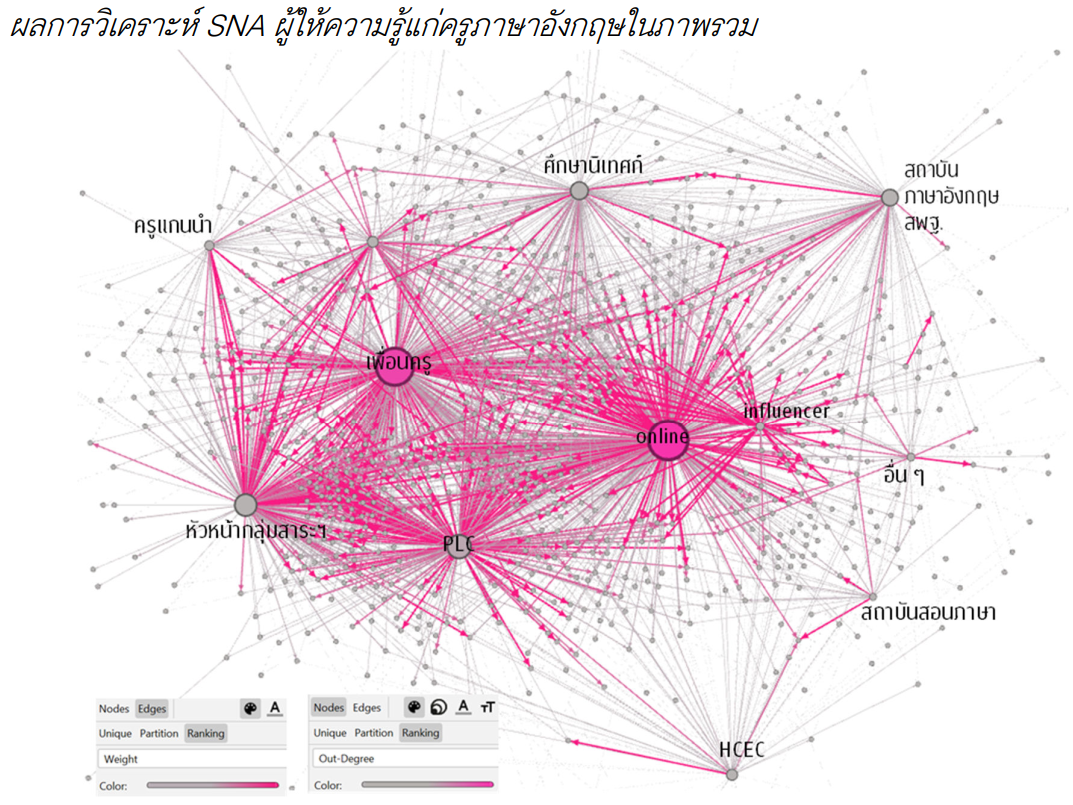Social network analysis of OBEC English teachers on knowledge support for policy implementation
Keywords:
Social Network Analysis, SNA, English teacher development, Policy implementationAbstract
The objective of this research is to analyze knowledge supporters to translate English teacher development policy into practice from 2018 to 2022 under Office of the Basic Education Commission. The study employs Social Network Analysis (SNA) by collecting data through surveys from 1,100 OBEC English teachers and 541 policy influencers in the field of English language development. The research findings reveal that the key knowledge sources for English teachers are online media, peers, Professional Learning Communities (PLCs), and head of English division respectively, with quality of knowledge acquisition scores ranging from 2.70 to 3.20 on a 5-point scale. This indicates that knowledge exchange occurs approximately once a month or less. Meanwhile, the influencer channel exhibits a significantly higher relationship quality, with an average relationship strength of 4.09, indicating that English teachers use this channel for learning purposes approximately 2-3 times per month.
For the channels that support English policy implementors, the most prominent sources are PLCs, educational supervisors, HCEC centers, English language institutes under the OBEC, and school principals, in that order. However, the quality of these relationships is not exceptionally high, with an average weighted out-degree centrality ranging from 1.46 to 2.44 on a 5-point scale. In the context of primary and secondary education levels, the analysis results show little variation in the relationships compared to the overall findings. Nonetheless, the quality of relationships at the secondary level is slightly better across almost all channels. Regarding closeness centrality, it is observed that nodes at both education levels have closely similar values, ranging from 0.37 to 0.48. However, there is a clear distinction in the scores for betweenness centrality. Additionally, it is evident that the types of individuals involved and the network structures in each educational region differ significantly.
References
กนกวรรณ ศิริเทศ และอภิชาติ เลนะนันท์. (2565). กลยุทธ์การขับเคลื่อนและพัฒนาทักษะการอ่านและเขียนภาษาอังกฤษของนักเรียนชั้นมัธยมศึกษาตอนต้น โรงเรียนเทพสุวรรณชาญวิทยา อำเภออัมพวา จังหวัดสมุทรสงคราม. วารสารสังคมศาสตร์เพื่อการพัฒนาท้องถิ่น มหาวิทยาลัยราชภัฏมหาสารคาม, 6(2), 171-178.
ชลภัคสรย์ กิตติมานะพันธ์. (2563). กลยุทธ์การส่งเสริมครูในการจัดประสบการณ์การเรียนรู้เพื่อพัฒนาความสามารถภาษา อังกฤษ สำหรับผู้เรียนระดับปฐมวัยของโรงเรียนเอกชน จังหวัดชุมพร. Journal of Social Science and Buddhistic Anthropology, 5(12), 107-121.
ชาญชัย ชำนาญเอื้อ, สุกัญญา รุจิเมธาภาส และหยกแก้ว กมลวรเดช. (2565). แนวทางการพัฒนาสมรรถนะครูด้านการ จัดการเรียนรู้การอ่านภาษาอังกฤษของโรงเรียนเทศบาลท่าอิฐ จังหวัดอุตรดิตถ์. วารสารสหวิทยาการเพื่อการพัฒนามหาวิทยาลัยราชภัฏอุตรดิตถ์, 12(1).
ณัฎฐ์ รัตนศิริณิชกุล และวรญา วิไลรัตน์. (2565). การพัฒนารูปแบบการบริหารชุมชนแห่งการเรียนรู้ทางวิชาชีพเพื่อการพัฒนาครูในการจัดการเรียนรู้แบบลงมือปฏิบัติ ด้วยการวิจัยเชิงปฏิบัติการแบบมีส่วนร่วม กรณีศึกษาโรงเรียนเทศบาล 4 (บ้านเชียงราย) จังหวัดลำปาง. Journal of Modern Learning Development, 7(10), 195-219.
ยุพิน เซามาไลเนน และอาคม อึ่งพวง. (2560). การบริหารจัดการเพื่อพัฒนาครูผู้สอนภาษาอังกฤษในโรงเรียนสังกัดสำนักงานเขตพื้นที่การศึกษา ประถมศึกษาชัยภูมิ เขต 1. วารสารศึกษาศาสตร์ ฉบับวิจัยบัณฑิตศึกษา มหาวิทยาลัยขอนแก่น, 11(1), 130-141.
วิทยา พาพิมพ์, สุพรรณริกา วัฒน์บุณย์, & พนาน้อย รอดชู. (2564). การพัฒนาชุดฝึกอบรมผ่านเครือข่ายสังคมการเรียนรู้ สคูโลจีในชุมชนแห่งการเรียนรู้ทางวิชาชีพออนไลน์เพื่อพัฒนาทักษะการสื่อสารภาษาอังกฤษสำหรับครูภาษาอังกฤษ ระดับชั้นประถมศึกษาจังหวัดกระบี่. วารสารวิชาการวิทยาลัยสันตพล, 7(1), 29-38.
ศรายุทธ สุภะโส และมนตรี วงษ์สะพาน (2562). การพัฒนาหลักสูตรพัฒนาครูในการกิจกรรมการเรียนรู้ภาษาอังกฤษเพื่อการสื่อสารโดยใช้ชุมชนการเรียนรู้ทางวิชาชีพ. Dhammathas Academic Journal, 19(2), 35-48.
ศิรินาถ ตงศิริ, ศุภวิตา แสนศักดิ์, ชนัตตา พลอยเลื่อมแสง, วรพจน์ พรหมสัตยพรต และสุมัทนา กลางคาร (2560). การวิจัยเพื่อนำนโยบายสาธารณสุขสู่การปฏิบัติอย่างมีประสิทธิภาพ. สถาบันวิจัยระบบสาธารณสุข.
สถาบันส่งเสริมการสอนวิทยาศาสตร์และเทคโนโลยี. (2563). การให้ความช่วยเหลือและสนับสนุนของครูส่งผลต่อผลการประเมินด้านการอ่านของนักเรียนอย่างไร. Focus ประเด็นจาก PISA, 57.
สำนักงานสภาพัฒนาการเศรษฐกิจและสังคมแห่งชาติ. (2566, กันยายน 3). ตัวชี้วัดด้านสังคม : สถิติด้านการศึกษา - ผลทดสอบทางการศึกษา จำแนกตามรายวิชาและระดับการศึกษา. https://www.nesdc.go.th/main.php?filename=PageSocial
Albers, B., & Pattuwage, L. (2017). Implementation in Education: Findings from a Scoping Review. Melbourne: Evidence for Learning. Retrieved from http://www.evidenceforlearning.org.au/evidence-informed-educators/ implementation-ineducation
Ashiedu, A. (2019). A Comparison of social network analysis software & application to Nigeria Corporate System [Doctoral dissertation]. University of Northern British Columbia.
Baker-Doyle, K. J. (2015). Stories in networks and networks in stories: A tri-modal model for mixed-methods social network research on teachers. International Journal of Research & Method in Education, 38(1), 72-82.
Bauer, M. S., Damschroder, L., Hagedorn, H., Smith, J., & Kilbourne, A. M. (2015).
An introduction to implementation science for the non-specialist. BMC psychology, 3(1), 1-12.
Carolan, B.V. (2014). SAGE Research Methods: Social Network Analysis and Education:
Theory, Methods & Applications. SAGE Publications, Inc.
Century, J., & Cassata, A. (2016). Implementation research: Finding common ground on what, how, why, where, and who. Review of Research in Education, 40(1), 169-215.
Education First. (2022). EF EPI: English Proficiency Index, a ranking of 111 countries and regions by English skills. www.ef.com/epi.
Gladden, M. (2017). From virtual teams to hive minds: Developing effective network topologies for neuroprosthetically augmented organizations, Neutroprothetic Supersystems Architecture (pp. 253-301). Synthypnion Academic.
Helbling, J., & Anderson, J. (2016). Social Network Analysis for assessing research team collaboration and implementation capacity. 2016 Resilience Week (RWS), 172-177. IEEE.
Hill, M., & Hupe, P. (2002). Implementing public policy: Governance in theory and in practice. Sage.
Howlett, M. & Ramesh, M. (2003). Studying public policy: Policy cycles and policy subsystems (2nd ed.). Oxford University Press.
McCann, H, Fünfgeld, H, Brown, J and Wylie, R (2016): Social networks and disaster resilience: an introduction. Report prepared for the Enhancing Networks for Resilience Project. Hamilton, Australia: Southern Grampians Glenelg Primary Care Partnership.
Newhouse, R., Bobay, K., Dykes, P. C., Stevens, K. R., & Titler, M. (2013). Methodology issues in implementation science. Medical Care, S32-S40.

Published
Versions
- 2024-12-27 (3)
- 2024-10-16 (2)
- 2024-08-31 (1)
How to Cite
Issue
Section
License
Copyright (c) 2024 Pataraporn Laowong, Chayut Piromsombat, Suwimon Wongwanich

This work is licensed under a Creative Commons Attribution-NonCommercial-NoDerivatives 4.0 International License.
All published content in JRM is licensed under a Creative Commons Attribution-NonCommercial-NoDerivatives 4.0 International License (CC BY-NC-ND 4.0).

